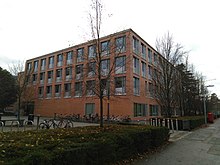|
Faculty of English, University of Cambridge
 The Faculty of English is a constituent part of the University of Cambridge. It was founded in 1914 as a Tripos within the Faculty of Medieval and Modern Languages. It could be studied only as a 'Part I' of a degree course, alongside a 'Part II' either in medieval languages or from another Tripos.[1] In 1926, the course became a distinct Faculty. The undergraduate degree course of 'Cambridge English', as well as the Faculty as a whole, is known for its distinctive focus on close reading (called Practical criticism), first championed by I. A. Richards and then later by William Empson and F. R. Leavis.[2][3] Since the course was founded in 1926, Practical Criticism, Tragedy and Shakespeare have been mandatory parts of the course; the English Moralists paper (now renamed the Ethical Imagination) has also remained as an optional paper.[1] In the present day, its research focus is wide ranging: from Old English literature through to contemporary, and also associated themes such as digital humanities and the history of the book.[4] One of its sub-divisions is the Department of Anglo-Saxon, Norse and Celtic, the only department in the world dedicated to the Early Middle Ages.[5] Notable staffThe faculty's senior teaching posts include a number of named professorships:
Other notable current academics:
People associated with the FacultyAcademics and public intellectuals
Writers
ActorsPoliticiansReferences
|
